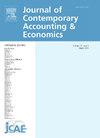From corporate emissions to financial statements: Understanding accounting conservatism in the wake of carbon risks
IF 2.9
3区 管理学
Q2 BUSINESS, FINANCE
引用次数: 0
Abstract
We examine the relationship between carbon risk and accounting conservatism using 7,636 firm-year observations from 29 countries. Using firms’ carbon emissions as a proxy for carbon risk, we find that firms with higher carbon risk exhibit greater conditional accounting conservatism. However, this positive relationship is weaker in firms with stronger corporate governance and higher institutional ownership, suggesting that effective internal and external monitoring reduces the reliance on conservative reporting in response to carbon-related exposures. Further analysis shows that the relationship becomes more pronounced after the 2015 Paris Agreement. The effect is also stronger in countries with active emissions trading schemes (ETS), higher governance quality, and stakeholder-oriented business cultures. These findings offer timely and policy-relevant insights for regulators, standard-setters, and policymakers, particularly in light of the introduction of IFRS S2 by the International Sustainability Standards Board (ISSB), which mandates climate-related financial disclosures and emphasizes the importance of integrating carbon risk into core financial reporting practices.
从企业排放到财务报表:了解碳风险后的会计稳健性
我们使用来自29个国家的7636个公司年度观察结果来检验碳风险与会计稳健性之间的关系。利用企业碳排放作为碳风险的代表,我们发现碳风险较高的企业表现出更强的条件会计稳健性。然而,在公司治理更强、机构所有权更高的公司中,这种正相关关系较弱,这表明有效的内部和外部监测减少了对碳相关风险的保守报告的依赖。进一步分析表明,这种关系在2015年《巴黎协定》之后变得更加明显。在拥有积极的排放交易计划(ETS)、更高的治理质量和以利益相关者为导向的商业文化的国家,这种影响也更强。这些发现为监管机构、标准制定者和政策制定者提供了及时且与政策相关的见解,特别是考虑到国际可持续标准委员会(ISSB)引入了国际财务报告准则S2,该准则要求进行与气候相关的财务披露,并强调将碳风险纳入核心财务报告实践的重要性。
本文章由计算机程序翻译,如有差异,请以英文原文为准。
求助全文
约1分钟内获得全文
求助全文

 求助内容:
求助内容: 应助结果提醒方式:
应助结果提醒方式:


